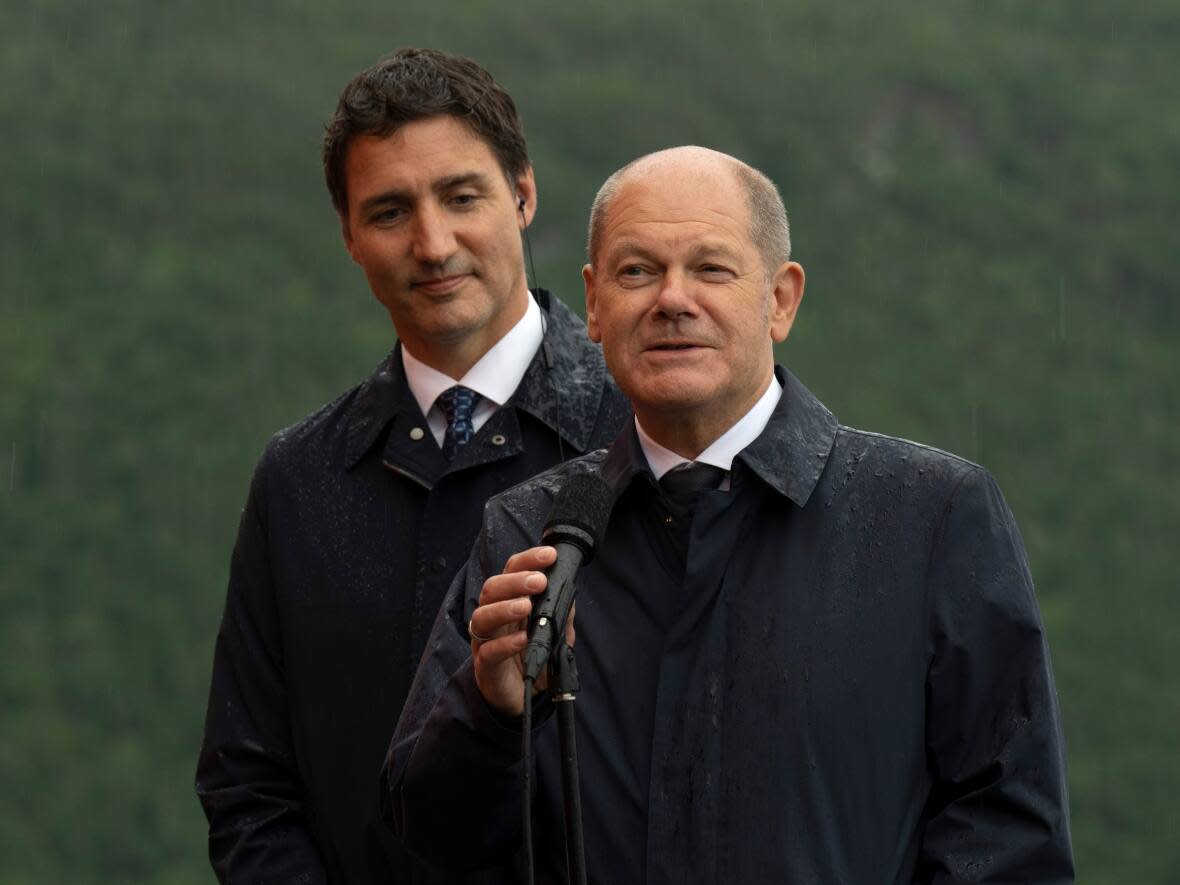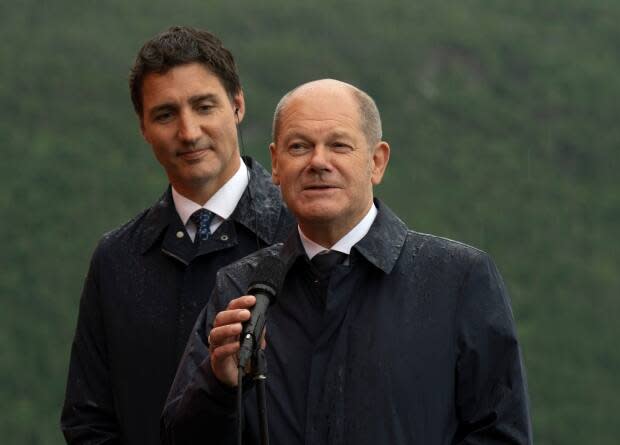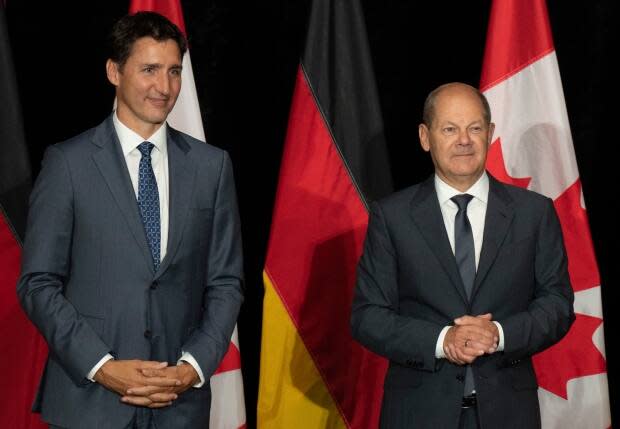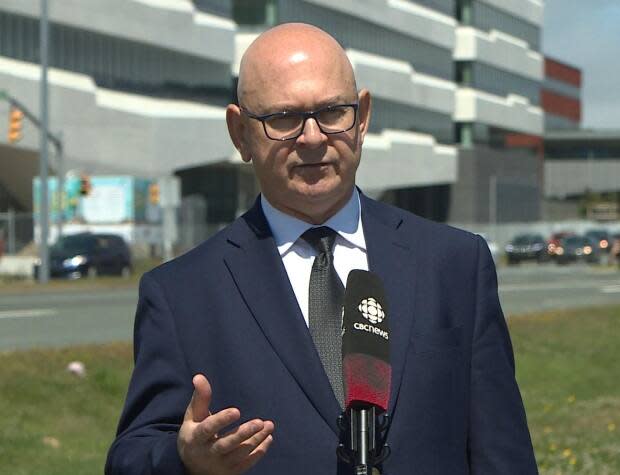Canada-Germany hydrogen deal could be 'game changer,' though skepticism remains


A financial analyst and some residents of the Port au Port Peninsula say Canada and Germany's so-called "hydrogen alliance" could be a game changer — but both groups remain skeptical about a proposed project in western Newfoundland that could produce some of the hydrogen Germany needs.
Larry Short, senior financial advisor at Short Financial, says the province has seen announcements like Tuesday's before.
"If there's any jurisdiction anywhere in the world that has seen megaprojects come and be launched with great fanfare, excitement, and fantastic photo ops, it's got to be the province of Newfoundland and Labrador," said Short.
Politicians and German business leaders flocked to Stephenville Tuesday for a whirlwind announcement in which Canadian Prime Minister Justin Trudeau and German Chancellor Olaf Scholz agreed to create a "transatlantic Canada-Germany supply corridor," and to export hydrogen by 2025.
World Energy GH2 is one company that has proposed to produce hydrogen in Newfoundland and Labrador. It wants to build 164 wind turbines on the Port au Port Peninsula to power a plant that would make green hydrogen from water.

In documents filed with the provincial government, the company said it aims to produce hydrogen by mid-2024. But the turbines and plant have not yet been built or approved, and at least one industry expert calls the company's timeline 'extremely ambitious.'
Short's skepticism lies with the bureaucratic environment, with hurdles that wind-to-hydrogen proposals would have to jump over and the swift production timelines the World Energy GH2 proposal in particular has set.
"There are 24 separate government agencies … that have to provide the stamp for this to go forward." said Short. "That is the bottleneck."
The provincial government has ordered an environmental assessment for the project.
In a statement, the Department of Environment and Climate Change says the company has six years to submit its environmental impact statement, which must detail where the turbines will be located, and their effect on animals, plants, and waterways.
"The key consideration in streamlining approvals is you cannot cut the environmental standards," said Short. "You actually have to have a very, very robust series of standards that have to be adhered to."

If environmental standards are not met, Short said, lawyers can get involved, further lengthening project timelines.
Short said Newfoundland and Labrador has work to do to streamline the process for companies looking to set up shop. Alberta, he said, has a "one-window" system in which companies have one contact within the government as their proposals move through the bureaucratic process.
"The provincial government has to amend its Environmental Act and permitting method so we don't become the holdup … without violating the environmental standards," he said.
Short said he supports the project, which he said could be a "game changer for the province," as long as investment comes from private money, not taxpayer subsidies.
He said he's also eyeing the possible effects of a deal that automakers Volkswagen and Mercedes-Benz signed with the federal government for access to critical minerals needed to make electric vehicle batteries.
"The number of industries that build around it are really quite extraordinary because, if indeed, we end up with something such as battery manufacturing, then that makes potential copper mines, cobalt etc., within the province … infinitely more feasible,"
Stella Cornect, mayor of Cape St. George, a community on the Port au Port Peninsula, she she's hopeful about the possibilities promised by the political and business leaders in the region this week.
"It's the economic boom we might experience," said Cornect.
But she noted residents have a lot of questions about World Energy GH2's wind turbines and how they'll affect the environment and land where they live.
"If we can get this environmental impact study done and done right, and if it can be explained to the people in the right way, in the right manner, then maybe the people might come to accept it as a viable industry that we could get in our area," she said.
Jasen Benwah of the Benoit First Nation on the Port au Port Peninsula said the project could be the birth of a new industry in the province that will reduce carbon emissions and produce little pollution.
"That's something that First Nations people embrace," said Benwah.
He also hopes the project will bring jobs and economic development to the region.
'What's the rush?'
A group of nearly 40-50 protesters gathered at the event, with some chanting "Go home, Trudeau."
Marilyn Rowe, one such protester, said destroying much of the landscape in order to produce green hydrogen demonstrates a lack of logic.
"What is the point of destroying beautiful mountaintops, rich with forests and animals, and plants, birds and water to make green hydrogen?" asked Rowe. "It defeats the whole purpose. We are already green."
Not only is Rowe critical of the toll the project would take on the environment, but she says the people of the community were not given enough time to formulate a strong response to the proposal. Rowe said they were given only 18 days to respond, while other indigenous leaders and towns had been in talks since March.
"We didn't have enough time," said Rowe. It was great that the minister ordered an environmental impact statement — we're just wondering, how can we trust the process when they've been trying to force this through at such lightning speed? What is the rush? We're not against hydrogen energy and green energy. We just don't want it in our community."


